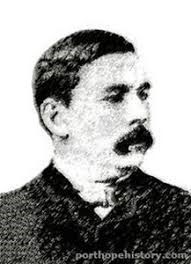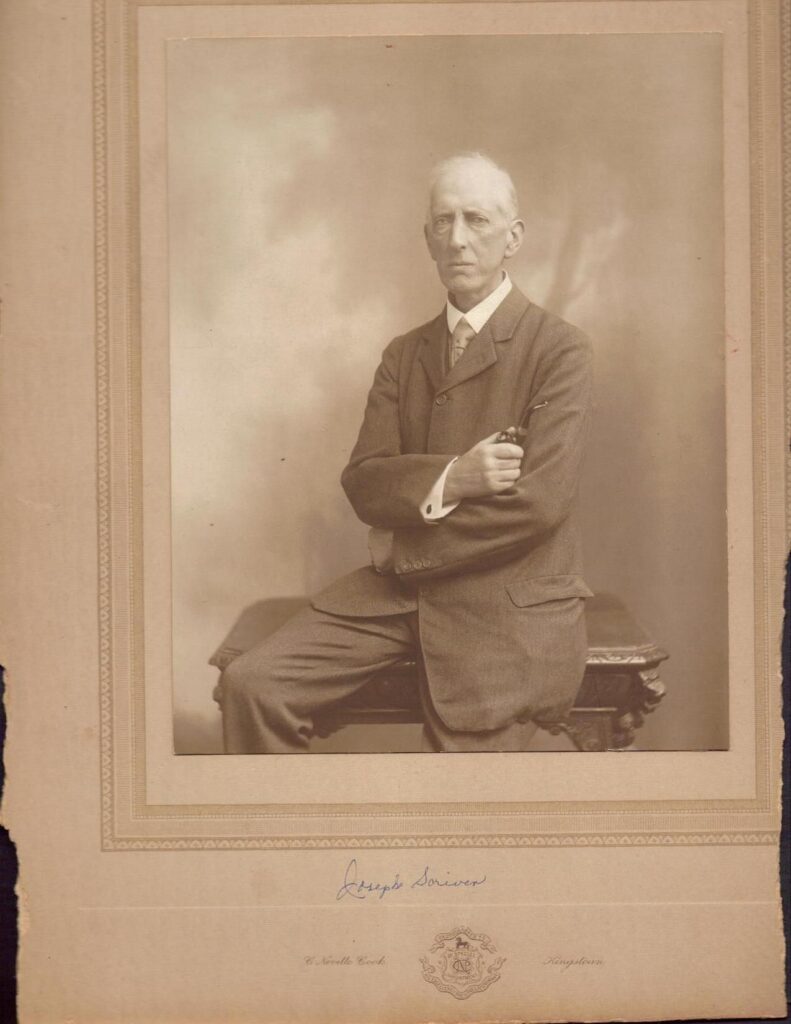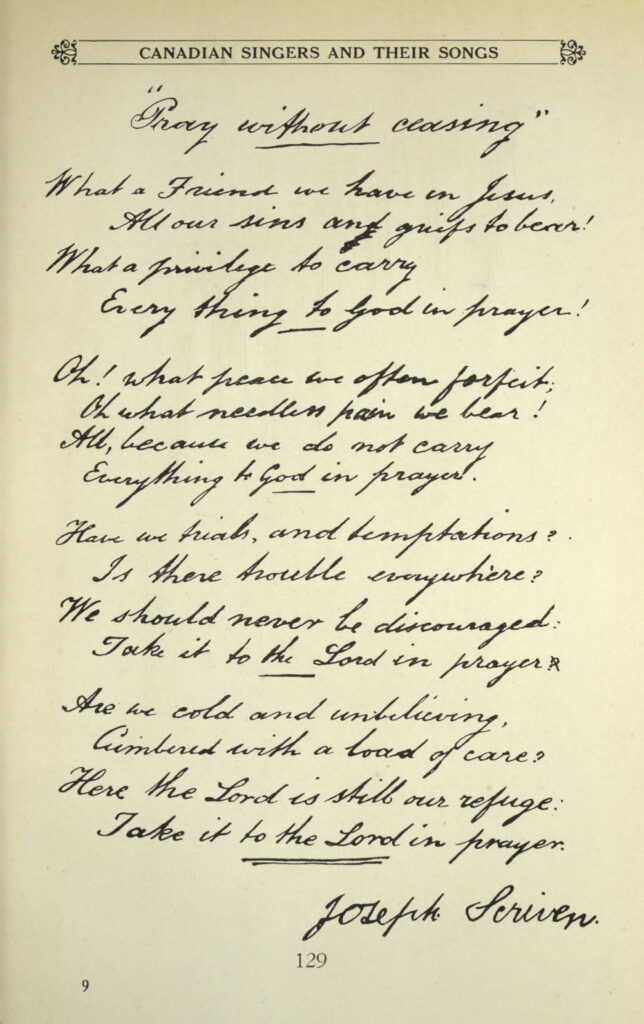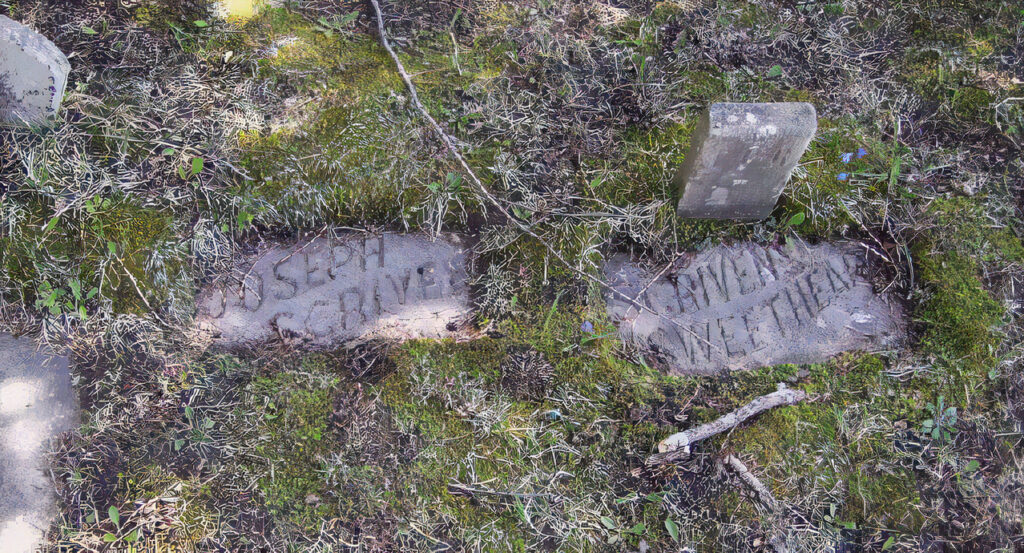Born: September 10, 1819, Seapatrick (near Banbridge), County Down, Ireland.
Died: August 10, 1886, Port Hope, Ontario, Canada.
Buried: Pengelly Cemetery (near Rice Lake), Ontario, Canada.
Joseph M. Scriven
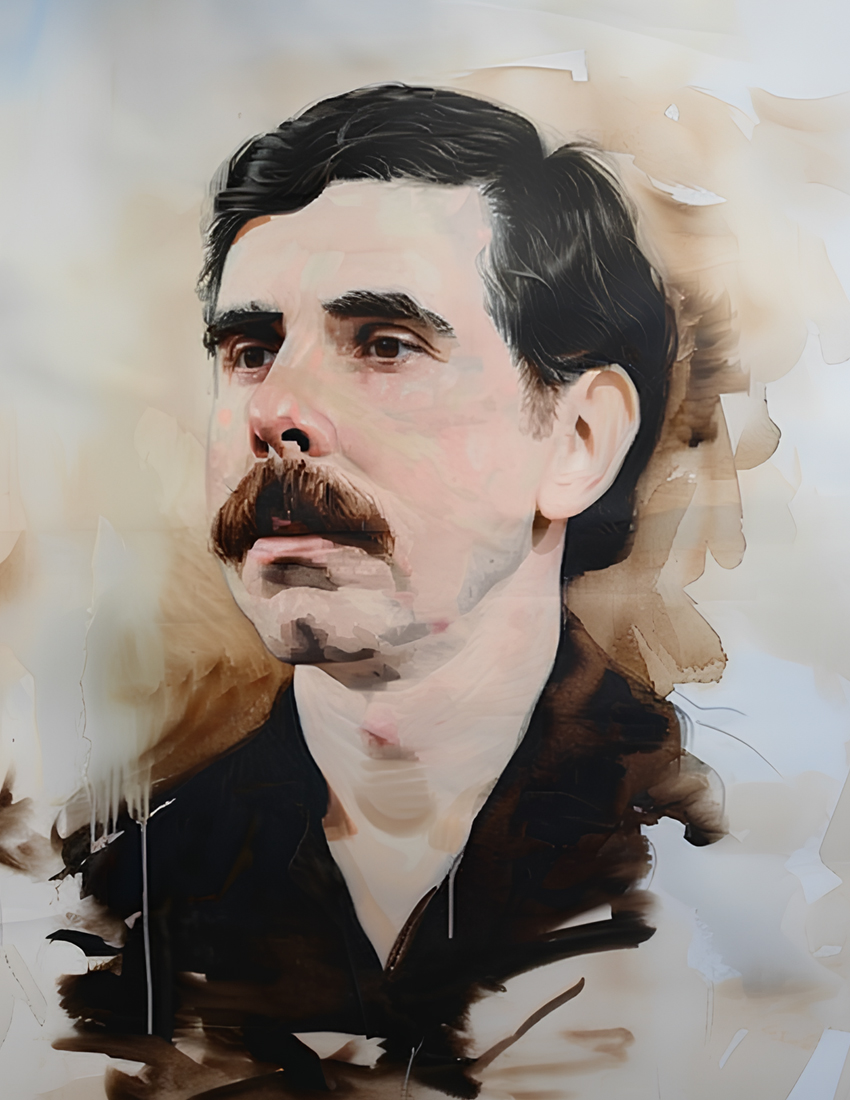
Hymns by Joseph Scriven
Scriven’s Portrait
A note from editor Don Chapman:
I like to include a real photograph of the hymn writer if I can find any, then clean it up and/or colorize it with AI-powered editing tools to bring these people to life. If I can’t find a photo (or if the hymn writer is from a time before photography) then I’ll create one with graphics software.
In the case of Joseph Scriven, many websites and sources mistakenly use an image of composer Charles Converse. After some dedicated searching, I managed to uncover a single, grainy photo of Scriven:
You’d think someone who had written a hymn of the magnitude of What a Friend We Have in Jesus would have at least a single decent picture but apparently not! To do this man justice I created an artistic interpretation you see above of that photo.
It’s all about putting a face to the names we sing every Sunday, and remembering that these people weren’t just some dusty old relics, but real people with real stories, real struggles, and a real heart for God.
Update: I discovered an apparant photo of an elderly Scriven on a genealogy website:
Original Manuscript of What a Friend We Have in Jesus
The story of how Joseph Scriven’s beloved hymn, “What a Friend We Have in Jesus,” spread from a few handwritten copies to a global phenomenon is a testament to the power of a simple yet profound message. Through the kindness of Mrs. A.M. Tremaine of Toronto, a glimpse into the hymn’s origins was revealed when she shared a small manuscript book of Scriven’s poems, given to her father, John Charles Benett, in the early 1850s.
Inside the back cover of this unassuming book, Scriven had inscribed what appears to be the first draft of his famous hymn. Originally titled “Pray Without Ceasing,” this version, comprising only 16 lines, differs slightly from the one we know today, with notable lines such as “Are we cold and unbelieving” and “Here the Lord is still our refuge.” The manuscript’s date aligns with the belief that Scriven had sent another copy to Dublin to comfort his mother after his father’s death in 1850.
According to James Sackville, a close friend of Scriven, the hymn was never published by the author himself. Instead, Scriven shared one copy with his mother and another with Sackville’s mother around 1855. Remarkably, even Scriven’s closest friends were unaware of his authorship until much later.
The Early Years: From Ireland to Canada
Joseph Medlicott Scriven was born on September 10, 1819, in Banbridge, County Down, Ireland, to austere Anglican parents. His father, Captain John Scriven of the Royal Marines, was a church warden, and his mother, Jane Medlicott, was the daughter of a Wiltshire vicar. Scriven’s upbringing was shaped by the burgeoning British Empire and the expectations placed upon him as the son of a middle-class family.
Scriven’s early life was marked by a thirst for knowledge and a desire to impress his parents. He attended Trinity College in Dublin for two years before leaving to enter the Addiscombe Military College, which serviced the East India Company with young gentlemen officers. However, after two years, Scriven resigned, citing health reasons that rendered him unfit for service in a tropical climate. It is possible that his conscience played a role in this decision, as he later demonstrated a deep compassion for others and a rejection of the establishment he was once a part of.
Love and Tragedy: The Shaping of a Compassionate Heart
Returning to Trinity College, Scriven earned his Bachelor of Arts degree in 1842 and became a teacher, traveling as a tutor for various families around Ireland. It was during this time that he fell in love with a young woman whose name has been lost to history. The couple was set to marry in the summer of 1843, but tragedy struck when Scriven’s fiancée drowned in the River Bann, possibly during a freak storm on August 3, 1843, just days before their wedding.
This devastating loss had a profound impact on Scriven’s outlook on life. He became depressed and rarely smiled, seeking answers to life’s questions through religion. He found solace in the Plymouth Brethren, a progressive Christian movement that sought to shake up the establishment and return to the true meaning of the Bible.
A Life of Service and Sacrifice
Scriven’s involvement with the Plymouth Brethren led to a falling out with his family, particularly after he gave away an expensive coat his mother had bought him to a beggar in Dublin. This act of generosity was a political statement that challenged the rich establishment of which he was supposed to be a part.
In May 1845, Scriven emigrated to Canada, settling in Woodstock near Hamilton. He became ill and, not wanting to burden the family he was staying with, sold all his possessions and returned to Ireland. There, he worked as a tutor to the son of Dr. Bartley, the surgeon to the First Royal Dragoons, and traveled with the family to the Middle East, where he had a profound spiritual experience on the road where St. Paul had “met Jesus.”
Scriven later moved to Plymouth, the center of the Plymouth Brethren movement, where he met and fell in love with a Miss Falconer. However, when she met another man, Scriven selflessly stepped aside and became close friends with the couple. The three friends decided to move to Canada, where Falconer married, and Scriven helped care for her husband when he became mentally ill.
The Birth of a Timeless Hymn
It was during his time of service and sacrifice that Scriven penned the words to what would become one of the most beloved hymns in Christian history, “What a Friend We Have in Jesus.” The poem, originally written as a letter to comfort his ailing mother, was refined while Scriven lived with the Sackville family, who ran a sawmill.
According to James Cleland’s 1895 biography of Scriven, the hymn writer made two copies of the poem while residing at the Sackville home near Rice Lake. He sent one copy to his mother in Dublin and gave the other to Mrs. Sackville, who cherished the gift well into her eighties. It is likely that Scriven’s mother played a significant role in sharing the hymn with others, ultimately leading to its publication and widespread popularity.
Not long before Scriven was called Home, he was visited by a neighbor who saw the poem written on a sheet of paper lying on a table at his bedside. “Are you the author of this lovely poem?” asked the visitor. Scriven’s reply was a testament to his deep faith and his understanding of the power of collaborating with the divine: “The Lord and I did it together.”
This beautiful explanation of the hymn’s origin reveals a profound truth about the Christian life. Too often, we try to navigate life’s challenges on our own, bearing needless pain and succumbing to self-pity when things go wrong. Scriven’s words remind us that we are never alone and that true strength and comfort can be found in partnership with God.
Love and Loss, Once More
Scriven found love again with Eliza Catherine Roche, the niece of Mrs. Pengelly, a woman whose sons he tutored. Both Mrs. Pengelly and Eliza Catherine converted to the Plymouth Brethren and were baptized in the icy waters of Rice Lake. Tragically, Eliza Catherine developed pneumonia, possibly as a result of the cold water, and died on August 6, 1860.
This loss had a profound effect on Scriven, and his mission to help others took on a new fervor. He devoted his life to aiding those who were too poor or sick to pay for help, often cutting wood and repairing houses for free, and giving away his money and possessions.
A Life of Persecution and Perseverance
Scriven’s street preaching often led to persecution, with locals beating him and throwing mud at him. Despite this, he persevered, picking himself up and starting again. His unwavering commitment to his faith and his compassion for others made him an annoyance in the eyes of some, with a local newspaper calling for this “nuisance” to be removed from the streets for “yelling and shouting like a good fellow occasionally.”
Was it these experiences of rejection and mistreatment that inspired Scriven to pen the poignant words of the third verse, offering comfort to those who face similar trials?
Do thy friends despise, forsake thee?
Take it to the Lord in prayer!
In His arms He’ll take and shield thee,
Thou wilt find a solace there.
These words serve as a powerful reminder that when we face rejection, loneliness, or hardship, we can always turn to Jesus in prayer. He is the friend who will never abandon us, the one who will provide comfort, protection, and peace in our darkest hours.
The Mystery of Scriven’s Death
In his late sixties, after a hard life, Scriven’s health began to fail. He feared becoming a burden on his friends, so he stayed with his friend James Sackville to recover from a fever. But on the night of October 10, 1886, a tragic event occurred that would leave many questions unanswered.
According to Sackville, he left Scriven alone in his room around midnight. When he later checked on his friend, Scriven was nowhere to be found. An extensive search was carried out, and soon after Scriven’s body was discovered in a nearby river, leaving his loved ones to wonder what had happened in those fateful hours.
Some believe that Scriven’s death was a tragic accident. In his feverish state, he may have wandered out of Sackville’s house seeking relief from the heat or a drink of water, only to stumble and fall into the river. Scriven’s deep faith and lifelong dedication to serving others, even in the face of personal suffering, make this theory plausible.
However, others have speculated that Scriven’s death may have been the result of something more troubling. Throughout his life, he struggled with depression and sorrow, having lost two fiancées to tragic deaths before their weddings. On the night he went missing, Scriven was reportedly heard imploring God to “take him home,” leading some to believe he may have taken his own life.
While we may never know the true circumstances surrounding Joseph Scriven’s death, one thing is certain: his life was one of unwavering faith and compassion. Even in the darkest of times, he found hope in his relationship with God and in the act of helping those in need.
In a poignant final resting place, he was buried in the Pengelly family burial plot near his lost love, Eliza, with “feet near feet, so that one day when they would rise from the grave they would face each other.”
A Legacy of Faith and Friendship
Despite the tragic end to his life, Joseph M. Scriven’s legacy lives on through his hymn, “What a Friend We Have in Jesus.” The poem, which he wrote to comfort his ailing mother, has become a source of solace and inspiration for millions of Christians around the world. Its message of finding friendship and comfort in Jesus during times of trial and sorrow resonates with people of all ages and backgrounds.
Can we find a friend so faithful,
Who will all our sorrows share?
Jesus knows our every weakness;
Take it to the Lord in prayer.
Scriven’s life, marked by love, loss, and an unwavering commitment to his faith and compassion for others, serves as a testament to the power of perseverance in the face of adversity. His story reminds us that even in our darkest moments, we can find hope and strength in the love of Christ.
As we sing the words penned by Joseph M. Scriven, we are reminded of the eternal friendship we have in Jesus, and the comfort and peace that can be found in turning to Him in prayer. May Scriven’s life and legacy continue to inspire us to live out our faith with compassion, generosity, and a steadfast commitment to serving others, just as he did throughout his remarkable life.
Historical Newspaper Accounts of Joseph Scriven
Editor’s note: After writing this article I found newspaper accounts of complaints and of Scriven’s arrest that I found interesting:
from the Guide, Saturday August 9, 1873
On Saturday evening August 2, Constable Johnston arrested Joseph Scriven while the latter, as is his wont, was preaching on the street, and conveyed him to the lock-up. Several young men, fearing he would be kept in confinement during Sunday, went to procure his release, but found that C. Brent, J.P., had already set him at liberty.
Mister Scriven, on Monday morning, appeared before the magistrate who told him to cease preaching on the front streets on Saturdays.
Johnston is generally condemned for making the arrest, particularly as profanity and obscenity on the streets go unchecked.
from the Port Hope Times, Thursday, September 2, 1880 Locals
A man named Scribbins has been, for some time past, in the habit of preaching on Ontario street, near Walton, yelling and shouting like a good fellow, occasionally. This man has become a nuisance and we appeal to the authorities to remove him. If he must preach, let him take up a position in the market-square in the afternoon, where he will not be in the way, and where he will not retard anyone from work which requires to be done in a given time. Mister Scribbins may be doing good, but we fail to see it.

